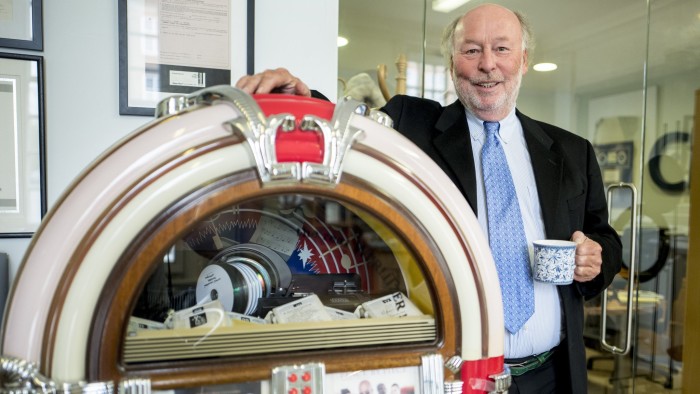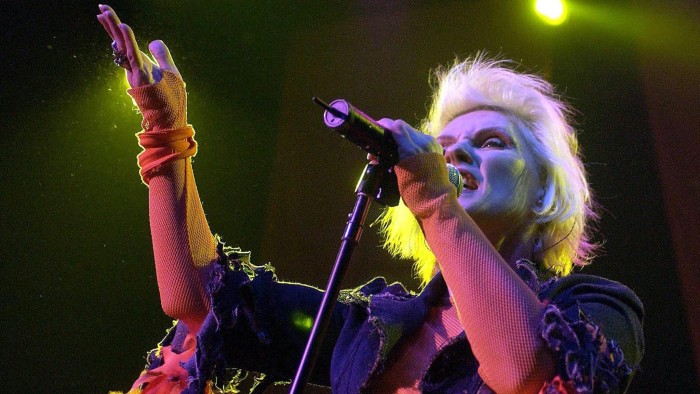My First Million — Chris Wright, record company mogul

Roula Khalaf, Editor of the FT, selects her favourite stories in this weekly newsletter.
Chris Wright, 73, co-founded the music company Chrysalis in 1968, aged 23, promoting Ten Years After, Blondie, Procol Harum, Spandau Ballet and Ultravox. The record division was sold to EMI in 1991.
In the 1990s, Chrysalis diversified into other ventures, launching Heart FM in London, and the ITV series Midsomer Murders. Mr Wright took over LBC in 2002. In 2003 he sold Chrysalis TV to All3Media for £50m.
He was the owner of Queens Park Rangers FC (1996-2001) and majority shareholder of Wasps Rugby Club (1996-2008). Mr Wright founded TV production company Chrysalis Vision in 2014. In June 2016 he bought back Chrysalis Records, in a partnership of four, and became chairman.
Did you think you would get to where you are?
Not really, because I grew up on a farm in Lincolnshire, and had no involvement in music until I went to university and discovered the music scene in both Manchester and Liverpool.
I did have a dream. I wanted to be a journalist and the careers people at school suggested I learn shorthand, but I did not do it because I thought it was a girly thing, and I was playing competitive table tennis most evenings.
When you had made your first £1 million did you want to slow down?
In April 1970 I was managing Ten Years After, and we were on a sellout tour in America. The group performed in ice hockey and basketball arenas, selling 20,000 tickets a time. We must have put on 40 gigs in 45 days. Some days we were taking three or four flights a day. I would have made around £1m from that trip. No way did I want to slow down.
I bought a house outside Wokingham for £46,000. It had 10 acres, a swimming pool and tennis court, and a golf course that I converted to a cricket pitch, where my team played against Tim Rice’s Heartaches team, and others. Eight years later, when I was working full-time in London, we sold the property for over £1m.
CV
Chris Wright
Born
Louth, Lincolnshire, September 1944
Education
King Edward VI Grammar School, Louth; University of Manchester, BA Politics and Modern History; further year at Manchester Business School
Career
1968 Founded Chrysalis Records with Terry Ellis (buying him out in 1985, immediately after which Chrysalis Group went public)
1991 Sold record division to EMI.
2002 Took over LBC
Lives
Holland Park, west London, and a village near Cirencester. Also owns a house in Antigua. He has a daughter and stepdaughter with his wife Janice, and three children from first marriage.
What is the secret of your success?
There is always an element of luck, but things can go right or go wrong when you least expect it. When we signed groups for the record company, some cost us very little and some a great deal. You never quite knew which ones would make it. In terms of recognising talent we had nothing but our gut feeling. The music business today is so much more marketing driven.
What was your best preparation for business?
I did a postgraduate business course but failed the diploma because I was too busy running the entertainment at university and my one-night-a-week Blues Club. But I gained hands-on experience in the music world, and I believe I did learn something at the business school.
Do you have time for personal financial planning?
I do have one person who helps me with personal finance more than anyone else, as it is not something that interests me. My wife does everything to do with the houses, and a full-time book-keeper deals with my personal accounting and office matters.
What is your basic business philosophy?
If you are doing a job that does not feel like a job you are going to work incredibly hard. When I started out at 21 the guy who had a rock group agency in Manchester offered me work on a commission only basis, organising entertainment for other universities. I did it for 18 hours a day, and willingly.
For the first three months I earned nothing because I started in June and the engagements were not fulfilled until the autumn term. I would take a day or two off every week to go for a job interview, just to claim the expenses to live on.
What was the most challenging period of your career?
In the summer of 1968 I had moved my college booking business to London, where I joined up with Terry Ellis who was doing the same thing, covering the south of England. Then I started managing Ten Years After, and they were invited to play in San Francisco and New York. To raise money for the air fares I sold the rights to the publishing of their songs for £2,500.
We just about managed to survive on the tour. But then my partner, instead of paying the travel agency, spent the £2,500 making a record with Jethro Tull, another group we had just signed.
In San Francisco I had had emergency surgery for appendicitis. I got back to England, claimed on the insurance for my hospital stay, and used that money to pay the travel agency. We were teetering on the brink when the Jethro Tull record was released and became a hit. We got an offer from Warner Brothers in America to license the record there for more than $50,000. Had it not been for a very friendly bank manager at the Welwyn Garden City branch of National Provincial, we would not have survived.
Do you want to carry on till you drop?
I think I am slowing down, having already scaled back quite a bit. I certainly could not work at the same pace as I used to. I hope to continue playing as much tennis as I do now and a bit more bridge. I will never be idle.
Do you believe in giving something back to the community?
For more than 30 years I have supported Nordoff Robbins, the music therapy charity that can change the lives of vulnerable people. It is where you can see the healing power of music, and I have friends with autistic children.
Do you allow yourself the odd indulgence?
I have bought and sold wine seriously, through Bordeaux Index, since 2000, mainly Bordeaux and some Burgundy. I happened to be in Bordeaux at the time they were releasing the 2001 vintage. Some of the Right Bank growers (from the Saint-Emilion and Pomerol area) believed that 2001 was going to be as good as 2000, and the prices were a fraction of the 2000 price.
I did buy 2000 wines as well, but I have much done much better from 2001. In 2001, I paid £4,000 a case for Petrus that is today worth £22,000. I have several cases.
Picasso or Art Deco as an investment?
I consider myself a bit of an expert on modern British pop art, and the Fauve movement from 1905 to 1907. I have works by Peter Blake, Anthony Donaldson, Peter Phillips, Clive Barker, Pauline Boty and a couple of Hockneys. I have French Post-Impressionists, including Raoul Dufy, Manguin, Marquet, Camoin and Othon Friesz.
I have someone who handles everything for me. William Matthew left Christie’s in 2008. I gave him a job, which he has now made into a business.
He does not make all the decisions but he knows things that I don’t, like the intricacies of salerooms, how they change the descriptions of paintings, and how to spot a fake.
Do you believe in leaving everything to children?
I have put the children in the position where they each own a house to live in. Then I think it is basically up to them what they do with their lives.
If there is anything left when I die they will get a chunk of it, and obviously I want to make provisions for any grandchildren. My wife and I certainly have no qualms about spending the children’s inheritance. For the last few years we have travelled around South America for three weeks each year.

Your most prudent investment?
It would be signing Blondie, though it was essentially on my co-founder Terry Ellis’s initiative not mine. We paid $500,000 to buy their contract in 1978. This would have contributed tens of millions to the company’s turnover.
What is the most you have ever paid for a bottle of fine wine or champagne?
I tend to dine in restaurants that allow me to take my own wine. If I have a bottle of wine at home that cost £25 and is now worth £100, in the restaurant it might be £400. I suppose I have opened wine that I could have sold for £2,000 or £3,000 a bottle, but I would have only paid £100 a bottle when I bought it, like the 1978 Romanée-Conti that I drank after one of our horses won a big race.
How have you survived the recession?
When we were selling our radio company in 2007 the markets were starting to go against us. We had asked for £300m, but got £180m. My stake was 30 per cent.
A far bigger problem to deal with than 2008 was the period from the mid-to-late 1990s and early noughties. The proliferation of illegal downloading and fewer people playing CDs caused the record business to go into a tailspin.
Comments